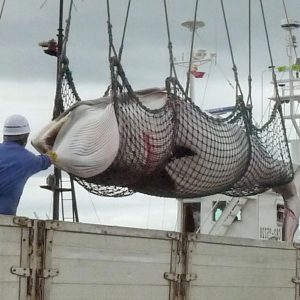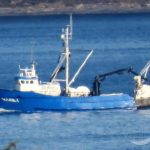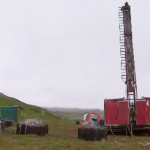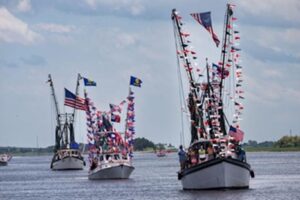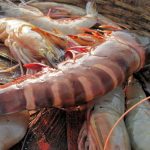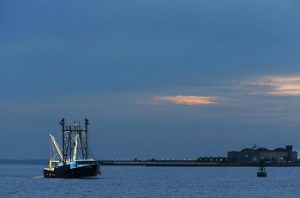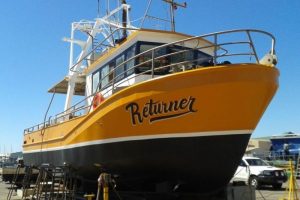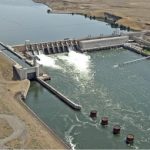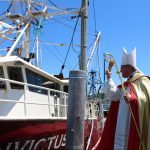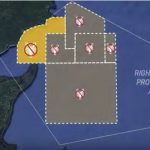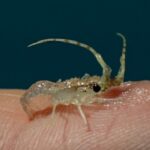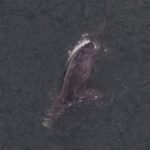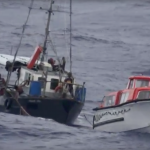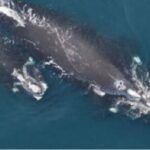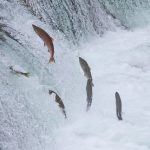Tag Archives: Japan
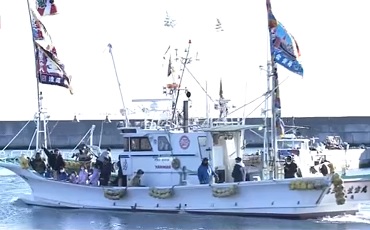
New Year’s traditional ceremony at Fukushima port
Fishers at one of the northeastern Japanese ports damaged by the 2011 earthquake and tsunami have held a traditional ceremony to mark the New Year. Ukedo port in the town of Namie in Fukushima Prefecture suffered severe damage to its breakwaters, seawalls and other infrastructure when it was hit by the disaster. Work to rebuild the facility was completed last year. The ceremony, which is said to date back about 100 years, took place on Sunday, with some 300 people participating. It began with a local Shinto priest performing a ritual in front of fishing boats. Video, >click to read< 11:49
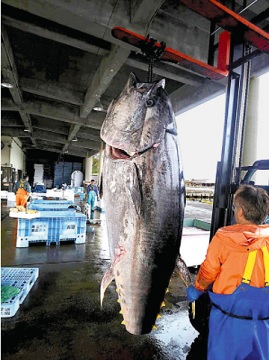
Increased quota offers ray of hope for bluefin tuna fishing industry
The decision to increase the quota cheered Takao Iwane, a 73-year-old fisherman who has plied the Sea of Japan waters off the town of Fukaura, Aomori Prefecture, for about 40 years. “Bluefin tuna prices go up in winter, so the announcement encouraged me,” said Iwane, who catches tuna using a handheld line with a single hook. Fukaura is known as one of the rock stars of Japan’s tuna fishing industry. Fishermen could operate without restrictions in waters off Fukaura several decades ago, but catches plunged around the time after regulations were introduced in 2015. In 2021, the four fishery cooperatives in Fukaura were allocated a combined quota of 302 tons. >click to read< 23:18
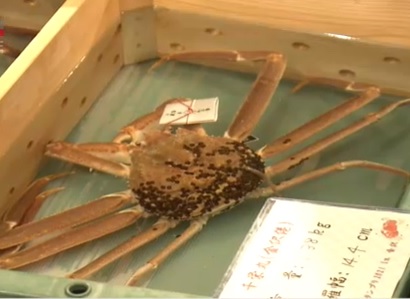
Japan: Large male snow crab fetches 5 mil. yen
A large male snow crab has fetched 5 million yen, or about $44,000 dollars, at the season’s first auction in central Japan. The auction of the winter delicacy was held on Saturday evening at a market at Kanazawa port on the Sea of Japan coast. Ishikawa Prefecture’s fisheries cooperative has begun to select large male snow crabs that are optimal in size and shape and sell them under a new brand name. Of 58 tons of Saturday’s catch, only one crab met all six criteria, including 1.5 kilograms in weight and 14.5 centimeters in shell width. Video, >click to read< 10:54
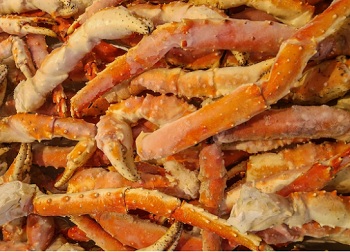
Bootstrapping – How Lowell Wakefield Made Crab King
While king crab fishing is among the most dangerous and lucrative activities in the world, it is only recent technology that makes it possible to extract this bounty from the sea,,, This has not always been the case. What is now known around the world as a culinary delicacy did not start out that way. In fact, before the mid-1940s, there were no king crab fishermen, no king crab fishing boats, and nothing that could be called a king crab industry. King crab legs simply were not widely consumed before the Second World War. Essentially, this industry was created through an evolutionary process executed by one man and his company, Lowell Wakefield and Wakefield Seafoods, Inc. A chronology of entrepreneurship. >click to read< 17:30
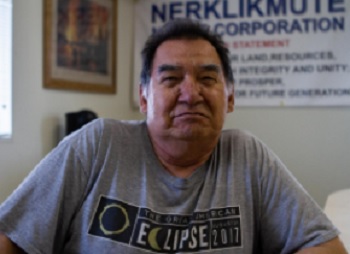
Why Are The Chum Runs So Low? It’s not just an Alaskan/Yukon phenomenon.
The State of Alaska has closed fishing for chum to protect the runs. For Yukon River families, chum is particularly important. Chinook salmon have been low for decades, but chum were the fish families could depend on until last year, when the summer chum run dropped below half of its usual numbers. This year the run dropped even further, to record lows. Biologist Katie Howard with the Alaska Department of Fish and Game said that the chum declines are not just occurring in the Yukon River. “When we talk to colleagues in the lower 48 and Canada, Japan, Russia, they are all reporting really poor chum runs. So it’s not just a Yukon phenomenon. It’s not just an Alaska phenomenon, but pretty much everywhere,” So why are the chum numbers so low? The short answer is no one really knows for sure. >click to read< 10:38
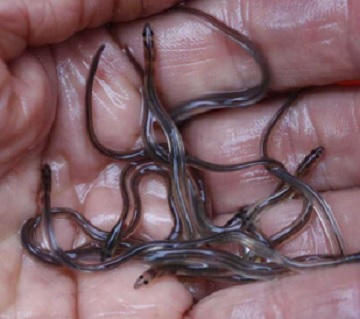
Elver eels rocket back up in value!
Maine is home to the U.S.’s only significant fishery for the baby eels, which are called elvers, and it’s taking place right now. Prices tanked last year due to disruption to the worldwide economy caused by the onset of the coronavirus pandemic. This year, the fishery is experiencing a return to normalcy. The tiny, wriggling fish are worth $1,634 per pound to fishermen, the Maine Department of Marine Resources reported on Monday. They’ve been worth between $1,300 and $2,400 per pound every year since 2015, except last year, when they were worth $525. >click to read< 11:22
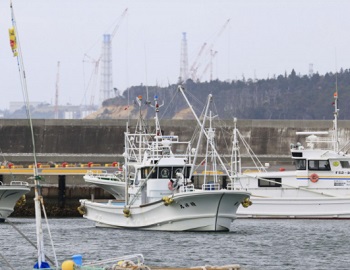
Japanese fishermen angered by gov’t decision on Fukushima plant water release
The controversial move came at “the worst time” for fishermen who are stepping up preparations for the restart of full-fledged coastal fishing off Fukushima Prefecture, northeastern Japan, after years of small-scale, trial fishing complete with safety checks for radioactive materials to win back consumer trust, ended in March. “Why now? I’m strongly opposed to the release (of treated water),” said Yoshimi Terashima, a fisherman from the Fukushima town of Shinchi. “I want to go fishing every day like I used to,” said the 73-year-old, who can do so only twice a week at present. >click to read< 09:10
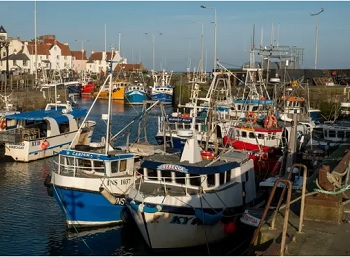
Coronavirus: UK Fishing industry shrank ‘dramatically’ during pandemic
Activity fell sharply in Britain and China in 2020 but increased in US, Japan and South Korea. In a year of unprecedented decline, the UK and China saw the most “dramatic declines” in fishing activity,, In Britain, whose fishing industry was badly hit by storms in the months before the pandemic, there was a drop,,, while in China there was a fall,, . Fishing activity also decreased in Italy, Spain, France and Norway, mostly in the first months of 2020. Early on in the pandemic, boats were tied up and many workers in the Scottish fishing industry were forced to use food banks as export demand fell, restaurants were closed and lockdown restrictions were introduced all over the UK. >click to read< 16:02
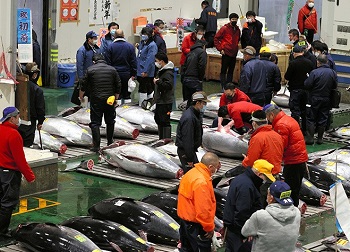
Bluefin tuna sells for low pandemic price at Toyosu’s 1st 2021 auction
The most expensive bluefin tuna sold under the hammer at 2021’s first auction at Tokyo’s Toyosu fish market failed to land a million-dollar bid or anything close on Jan. 5, reflecting the chill the novel coronavirus pandemic has on the restaurant industry. The 208.4-kilogram fish caught off Oma, Aomori Prefecture, went for just 20.8 million yen ($202,270) to Yamayuki, the market’s intermediary wholesaler.,,, Minoru Tanaka, 65, the captain of a tuna trawler based in Oma, caught the fish. 5 photos, >click to read< 10:30
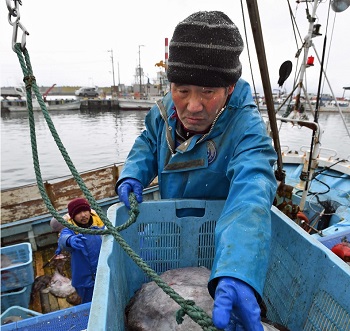
Hokkaido fishing villages face tough decision over nuclear disposal sites
A frosty wind was blowing in from the Sea of Japan at the Suttsu fishing port in Hokkaido in late November. There, catching anglerfish with a grim look on his face was 77-year-old fisherman Kyozo Kimura.,, In 1977, Kimura, a native of the town of Matsumae,,, Longline fishing of trout prospered at the time, and he reminisced about the time when he got a new 29-ton ship,,, But that dream did not last long.,, Kimura ventured into scallop farming. In August, local residents saw shocking headlines that Suttsu was considering applying for preliminary research into being a final disposal site for high-level radioactive waste produced from nuclear power plants. Hearing the news, Kimura,, >click to read< 13:51
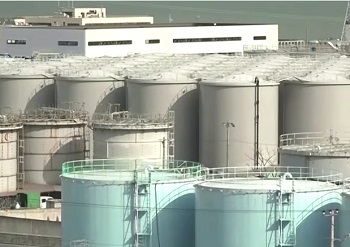
Japan is planning to release millions of gallons of treated radioactive water from Fukushima Dai-Ichi nuclear plant into the Pacific Ocean
The release likely won’t occur for another two years and could take decades to complete,,, Dumping the water into the ocean threatens to hurt Japan’s relationship with South Korea, and comes despite opposition from environmental groups and the local fishing industry, which is still struggling to recover from the disaster. The release of the water “could deal a fatal blow to the future of Japanese fishery,” said Hiroshi Kishi, the chairman of the Federation of Japan Fisheries Cooperatives. “We absolutely oppose to the release of the water.” >click to read< 16:13
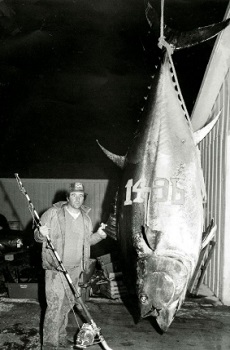
A Tuna’s Worth – Inside a Canadian fishery that pursues them
Bluefin tuna are a luxury that feeds the egos of many, the bellies of few.,, North Lake, a community too small to support an ATM, calls itself the tuna capital of the world. In the 1960s and 1970s, anglers here regularly landed bluefin that broke world records. People came from all over the planet to hunt the storied giants, which swam faster and fought harder and grew bigger than any other sport fish. In 1979, a North Lake fisher named Ken Fraser caught the largest in history, at 679 kilograms. In a black-and-white photo commemorating the event, Fraser stands wide-eyed, blood-spattered, and completely dwarfed by the hanging behemoth—as if he were the prey, not the predator.,, On the other side of the world, in Japan, bluefin was well on its way to becoming the most expensive item on sushi menus. photos, >Audio report, click to read< 09:57

4,000 wind chimes displayed in hopes of large catch in city hit by 2011 tsunami Great East Japan Earthquake
The wind chimes have been hung at four commercial buildings facing onto Kesennuma Bay and that opened in July. At one of them called Mukaeru, a local designer has painted fireworks on a passage wall in fluorescent colors. Wind chimes are traditionally thought to drive away evil, and the ones on display have been purified at a shrine. Each of them also bears a strip of paper inscribed with a prayer for a large catch. The wind chimes are illuminated at night, creating a fantastic atmosphere for visitors. >click to read< 15:52
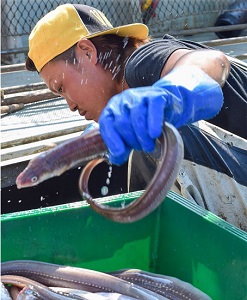
Japan: A Fisherman in the Time of the Coronavirus
This coronavirus is unbelievable. Nobody’s catching any fish in Japan, but even so, they’re selling for next to nothing. I’m a fisherman from a village in Miyagi Prefecture. Every day you hear reports that Japan’s “entering a crucial stage in the fight against COVID-19.” It’s the same for the fishing industry. Of course, we’re taking the same actions as everyone else against the coronavirus, but we have our own problems too: meager hauls and plummeting fish prices. I make all sorts of seasonal catches through the year—mainly autumn chum salmon, but also conger eels, Pacific cod, red sea bream, olive flounders, sea squirts, Kinka mackerel, Spanish mackerel, common octopuses, giant Pacific octopuses, crabs . . . in fact, so many I can’t write them all down. These are really fertile fishing grounds. Or maybe I should say they were really fertile fishing grounds. >click to read< 09:37
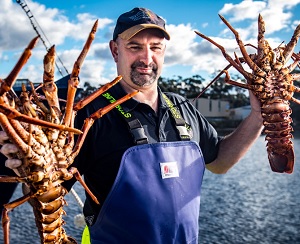
Coronavirus: Emergency ‘lobster flights’ to save $800 million worth of seafood
Hundreds of tonnes of lobster and abalone will be flown on emergency freight flights out of Australia in a $110 million push to stop a massive downturn across the seafood sector. The government will fund 200 40-tonne flights of Australian produce to China, Japan, Hong Kong, Singapore and the United Arab Emirates as stock goes to waste and staff are laid off. In Western Australia alone up to 98 per cent of its lobster produce usually heads to China. Fishers have pulled up their pots as they cannot get the product into centres such as Shanghai. >click to read< 08:33
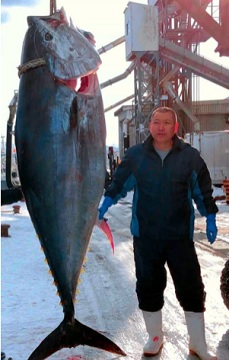
“New Year’s happy news.” Fishing boat reels in $1.79 million tuna to start the year
Captain Masahiko Yamamoto has the fish story of the new year, the day he hit the lottery at sea, landing a million-dollar catch. Yamamoto, 57, was on his boat when he heard that a 276-kilogram bluefin tuna he landed sold at the first auction of the year at the Toyosu fish market in Tokyo on Jan. 5. The winning bid of 193.2 million yen ($1.79 million) from a Tokyo-based sushi chain operator was the second-highest ever in the New Year’s auction.,, The waters here have produced tuna fetching the highest price in the New Year’s auction for nine consecutive years, making Oma famed as the “pole-and-line fishing bluefin tuna town.” >click to read< 11:22
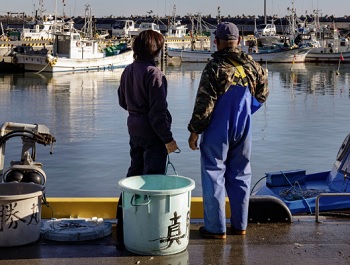
Japan wants to dump contaminated water from the nuclear plant. Fishermen fear the worst.
The devastating earthquake and tsunami that swept through northern Japan in March 2011 took a lot from Tatsuo Niitsuma, a commercial fisherman in this coastal city of Fukushima Prefecture. The tsunami pulverized his fishing boat. He demolished his home. Most devastating of all, it cost the life of his daughter. Now, almost nine years after the disaster, Niitsuma, 77, runs the risk of losing even more, all his livelihood, as the government considers releasing contaminated water from a nuclear power plant destroyed by tsunami waves. >click to read< 08:09
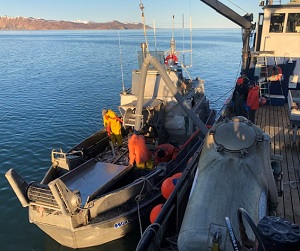
Fishermen participating in Alaska’s largest herring fishery have a huge quota to fill next year. But the primary customer isn’t buying.
“I’m a recovering herring fisherman,” joked Bruce Schactler. Schactler, who lives in Kodiak, has been fishing in Togiak off and on since 1985. But he won’t be returning this summer. “The market is so bad that Trident will not be buying fish this year, so we’re not going. Every ton that is frozen and shipped off to Japan is a loser. There’s no money being made,” he said. >click to read< 07:06
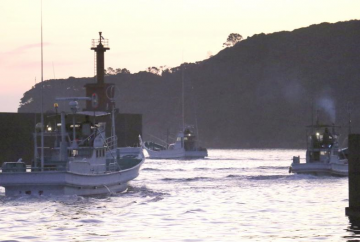
Whaling town Taiji begins dolphin hunt
The hunting season for dolphins using a controversial “drive-hunting” method began Sunday in the whaling town of Taiji, Wakayama Prefecture, without any major protest from animal-rights groups. While local police officers were on high alert for anti-whaling campaigns, 12 boats left the town’s port around 5 a.m., but all returned without any catch,,, An ad hoc police box has been set up near the port and, together with police officers, personnel from the Japan Coast Guard will be deployed around the area. “Thanks to the security, we can do (hunting) with ease,” >click to read< 15:42
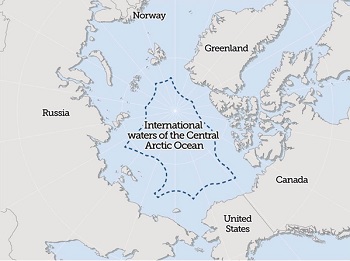
U.S. ratifies The Agreement to Prevent Unregulated High Seas Fisheries in the Central Arctic Ocean
The United States has become the fourth jurisdiction after Canada, the European Union and Russia to ratify a landmark international agreement that aims to prevent unregulated commercial fishery in the high seas of the Central Arctic Ocean, officials at the State Department announced Tuesday. The Agreement to Prevent Unregulated High Seas Fisheries in the Central Arctic Ocean, which was signed in Ilulissat, Greenland last October, includes the so-called Arctic Five – Canada, Norway, Russia, Denmark (Greenland and the Faroe Islands), the U.S. – as well as the major fishing nations – Iceland, Japan, South Korea, China and the EU. >click to read< 17:56
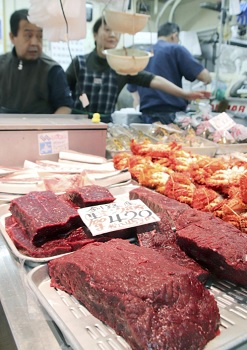
1st whale meat auction held since restart of Japan’s commercial hunt
Whale meat auctions were held Thursday in different parts of Japan, the first since the country ended its 31-year commercial whaling hiatus earlier this week, with some cuts sold for over 10,000 yen ($93) per kilogram. A whaling fleet left Kushiro on Japan’s northernmost main island of Hokkaido on Monday to hunt in coastal waters and took two minke whales later the same day. Approximately 66 kg of meat from one of the two whales was then brought to Taiji, Wakayama Prefecture, for an auction because a vessel from the town was among the fleet. >click to read< 09:49
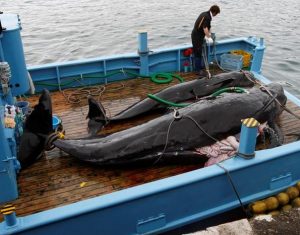
What’s behind Japan’s support of whaling?
Japan has for decades been steadfastly defiant about hunting whales despite widespread anger, including from key allies like the United States. After roughly 30 years of what it has called scientific research whaling, which saw several hundred minke whales taken annually in the Antarctic and North Pacific, Japan in December announced it would leave the International Whaling Commission(IWC) and resume commercial whaling on July 1. >click to read< 14:21
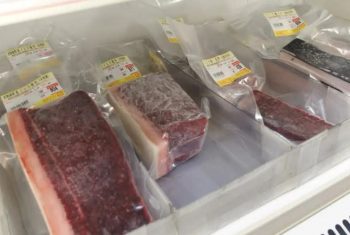
Why Japan risked condemnation to restart commercial whaling
Fishermen in the village of Taiji are counting the days until July, when they will be able to hunt large, fatty minke whales commercially for the first time in decades. The community, which faces the Pacific coast of central Japan, is still haunted by its moment in the international spotlight 10 years ago, when the documentary “The Cove” criticized its dolphin culls and attracted a flood of activists. Yet, a sense of optimism is spreading. “The availability of more types of whales will make more people interested” in eating the meat, predicted Shinichi Shiozaki, who sells processed whale products. “It’s a good thing.” >click to read<13:14
B.C.-led international expedition to probe ailing Pacific salmon stocks
An unprecedented international collaboration could revolutionize salmon science and fisheries management, return forecasting and even hatchery output. Nineteen scientists from Russia, Canada, the United States, Japan and South Korea are set to probe the secret lives of five Pacific salmon species with a four-week grid search and test fishery across the Gulf of Alaska. The expedition begins next week aboard the Russian research ship MV Professor Kaganovsky. “We know virtually nothing about what happens to salmon once they leave near-shore waters in the Salish Sea,” said expedition organizer Dick Beamish. >click to read<13:56
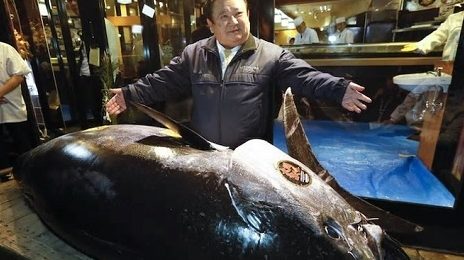
Japanese bluefin tuna sold at auction for record $4.4m
A giant bluefin has been tuna was sold for a record 333.6 million yen ($A4.4 million) in the first auction of the year at Tokyo’s new fish market. The 278-kilogram tuna, valued at 1.2 million yen per kilogram, was caught in Oma, one of the best tuna fishing grounds in Japan, on the northern tip of main island Honshu. It was bought by Kiyoshi Kimura, president of Sushi Zanmai, a major sushi restaurant chain. “I did not expect it to be that expensive. However, since I was able to buy a good one, I’d like customers to try it,” Kimura told reporters. >click to read<22:51
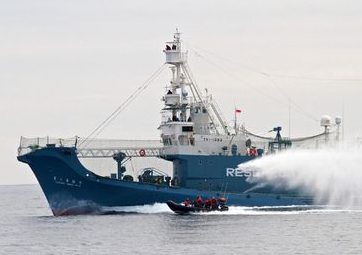
Japan to start whaling again
Japan has announced it will resume commercial whaling next year and withdraw from the International Whaling Commission. A government spokesman made the announcement on Wednesday in a move expected to spark international criticism. The decision was made at a cabinet meeting on Tuesday after the government decided it would be difficult to resume commercial whaling while a member of the international body. “We have decided to withdraw from the International Whaling Commission in order to resume commercial whaling in July next year,” top government spokesman Yoshihide Suga told reporters. Mr Suga said whaling would be limited to Japan’s territorial waters and exclusive economic zones. >click to read<11:56
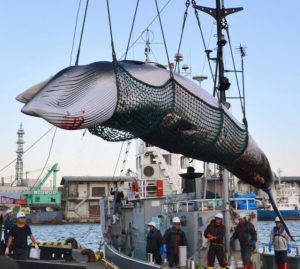
Japan to pull out of IWC to resume commercial whaling
Japan has decided to pull out of the International Whaling Commission (IWC), officials told AFP on Thursday, as Tokyo reportedly gears up to resume commercial whaling activity next year. Such a move would spark international criticism against Japan over whale conservation and deepen the divide between anti- and pro-whaling countries. “We are considering all options” including the possibility of withdrawal from the 89-member IWC, Fisheries Agency official Yuki Morita told AFP. Another official at the foreign ministry confirmed “all options are on the table but nothing formal has been decided yet”. >click to read<17:10
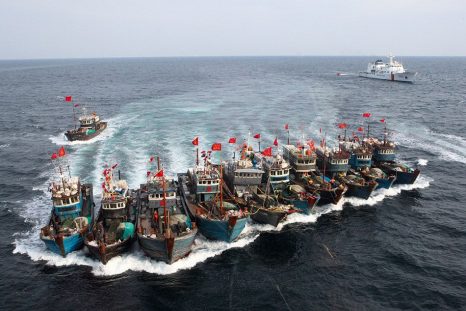
China, Spain, Taiwan, Japan and S Korea account for 85% global fishing efforts
The research, led by scientists at Global Fishing Watch, a research organization that uses satellite data to track fishing activity, examined some 22 billion ship-location data points for more than 70,000 industrial fishing vessels between 2012 and 2016. It found commercial fishing hotspots in the northeast Atlantic and northwest Pacific, as well as in nutrient-rich areas off the coasts of South America and West Africa. The study also found that fleets from just five countries — China, Spain, Taiwan, Japan, and South Korea — account for more than 85% of fishing efforts in the high seas. >click to read< 09:51
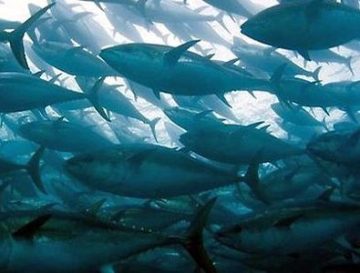
Japan to enforce penalties for bluefin catch quota violations starting next month
The Fisheries Agency will start enforcing penal regulations on Pacific bluefin tuna caught by Japanese fishermen in January, in line with stricter international controls aimed at overfishing. The agency hopes that comprehensive resources management will allow fishermen to continue catching the prized fish amid concerns that global tuna stocks are being depleted, officials said. The Western and Central Pacific Fisheries Commission allocates catch quotas to its members, including Japan and the United States. click here to read the story 16:15






